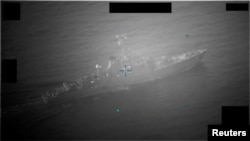The United States Navy recently prevented Iranian naval vessels from seizing two oil tankers in international waters on a single day.
In the first incident on July 5, an Iranian vessel approached the Marshall Islands-flagged oil tanker TRF Moss in the Gulf of Oman at 1 a.m. local time. In a statement, U.S. Naval Forces Central Command said the Iranian vessel “departed the scene” after the U.S. deployed the USS McFaul, a guided-missile destroyer, along with surveillance assets, an MQ-9 Reaper drone and a P-8 Poseidon maritime patrol aircraft.
Three hours later, a Bahamian-flagged oil tanker, the Richmond Voyager, sent out a distress signal when the Iranian navy “fired multiple, long bursts from both small arms and crew-served weapons.” While the Richmond Voyager sustained no casualties or significant damage, several rounds hit the ship’s hull near crew living spaces. In addition, another Iranian naval vessel closed within a mile of the Richmond Voyager and ordered the commercial tanker to stop.
Receiving the distress signal from the Richmond Voyager, the U.S. guided-missile destroyer McFaul set off toward the Richmond Voyager “at maximum speed.” The Iranian navy vessel left when the U.S. destroyer arrived on the scene.
Both of the oil tankers threatened by Iran on July 5 continued their journeys.
Other vessels have not been so lucky. Earlier this year, Iran seized two oil tankers in less than a week in the same area. In its statement, the U.S. Naval Forces Central Command noted that since 2021, “Iran has harassed, attacked or seized nearly 20 internationally flagged merchant vessels, presenting a clear threat to regional maritime security and the global economy.” In response to Iran’s aggression, the United States and its partners have increased the rotation of ships and aircraft in the region, which includes the critical Strait of Hormuz, through which 20% of all crude oil passes.
Regarding the incidents of July 5, Vice Admiral Brad Cooper, Commander of the U.S. Naval Forces Central Command, said, “I couldn’t be prouder of the entire team, especially the exceptional effort by the McFaul crew, for immediately responding and preventing another seizure. We remain vigilant and ready to protect navigational rights in these critical waters.”














